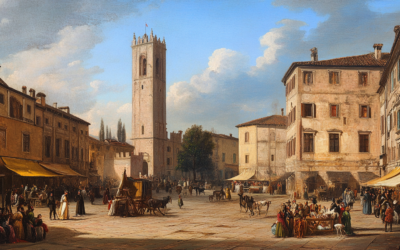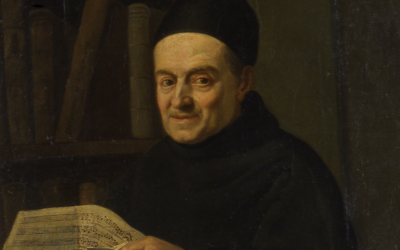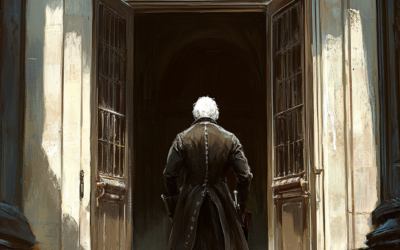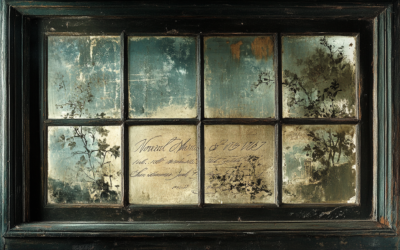Leopold Mozart’s Fabricated Legacy
The False Sonnet of Corilla Olimpica
Leopold Mozart’s relentless pursuit of fame for his son Wolfgang led to questionable tactics, including fabricating a sonnet by the renowned poetess Corilla Olimpica. This desperate attempt to elevate Wolfgang’s reputation casts a shadow over the Mozart legacy.
Mozart: The Fall of the Gods
This book offers a fresh and critical look at the life of Wolfgang Amadeus Mozart, challenging the myths that have surrounded him for centuries. We strip away the romanticised image of the “natural genius” and delve into the contradictions within Mozart’s extensive biographies. Backed by nearly 2,000 meticulously sourced citations, this work invites readers to explore a deeper, more complex understanding of Mozart. Perfect for those who wish to question the traditional narrative, this biography is a must-read for serious music lovers and historians.
"Leopold Mozart's false claim that Corilla Olimpica wrote a sonnet for Wolfgang was not just a father’s exaggeration—it was a deliberate fabrication to manufacture a legacy that never existed."
@MozartrazoM
One of the most infamous examples of Leopold Mozart’s manipulative behaviour during Wolfgang’s Italian tour in 1770 involves the celebrated poetess Maria Maddalena Morelli Fernandez, better known as Corilla Olimpica. According to Leopold’s letters, Corilla supposedly composed a sonnet in honour of Wolfgang, delivered by the English violinist Thomas Linley. However, this story is full of glaring inconsistencies, pointing to a deliberate fabrication by Leopold in his effort to promote his son.
Corilla was a respected figure in the Florentine cultural scene, renowned for her eloquent poetry. Yet, the so-called sonnet Da poi che il Fato t’ha da me diviso, supposedly dedicated to Wolfgang, is riddled with grammatical errors and lacks any reference to Mozart’s actual musical talents. Its generic content could have been directed at anyone, making it highly unlikely that Corilla, known for her precision, would have penned such a lacklustre piece.
More damning is the fact that Corilla herself never mentioned writing any poem for Mozart, nor did Linley, the alleged intermediary. The complete absence of this event from contemporary records and Corilla’s own writings strongly suggests that Leopold invented the entire episode. It seems that Leopold, ever the ambitious stage father, was willing to bend the truth to construct a narrative that would further glorify his son. By associating Wolfgang with prominent cultural figures like Corilla, Leopold hoped to boost his son’s status in the eyes of the aristocracy and potential patrons.
Leopold’s need to fabricate this sonnet speaks volumes about the lengths he was willing to go. Far from being an innocent promoter of his son’s talent, he consistently manipulated events and exaggerated Wolfgang’s achievements. The supposed involvement of Corilla Olimpica in Mozart’s early career is yet another instance of Leopold’s unscrupulous methods to establish his son’s reputation, even at the cost of truth.
The reality is that Corilla, at the time, was far more focused on her relationship with the violinist Pietro Nardini, not on some adolescent prodigy passing through Florence. Leopold’s fabrication reveals a deep insecurity about his son’s place in the musical world, and this episode casts serious doubt on the authenticity of many accounts from Wolfgang’s early career.
You May Also Like
Debunking the Romantic Virtuoso Image
The image of Mozart as a Romantic-era virtuoso is a misleading anachronism, fuelled by 19th-century propaganda. Wolfgang was no transcendental pianist, but a product of an era where music was more galant than heroic.
The Visit to Verona
In Verona, young Wolfgang Mozart impressed the local nobility, but the reality behind the scenes reveals a carefully managed public image, where strategic networking and curated praise played key roles in shaping his growing reputation.
Mozart’s Training
The myth of Mozart’s genius is nothing more than a carefully crafted illusion, propped up by misplaced attributions and romanticised biographies. Behind his so-called brilliance lies the reality of his father’s dominating influence and a lack of formal education.
From London to Vienna
The Mozart family’s journey from London to Vienna was marked by illness, failed opportunities, and the relentless ambition of Leopold Mozart, revealing the pressures and challenges behind the facade of success.
The Ambiguous Legacy of Leopold Mozart
This post explores the multifaceted and often controversial life of Leopold Mozart, providing insight into the complexities and contradictions that defined his career and legacy.
Mozart’s Illusory Triumphs
The story of the young Mozart’s so-called triumphs at the courts of Europe is a tale riddled with embellishments, half-truths, and fabrications—many courtesy of Leopold Mozart himself and those who later sought to mythologize his son. One such example is the visit to Munich on 12 January 1762.







